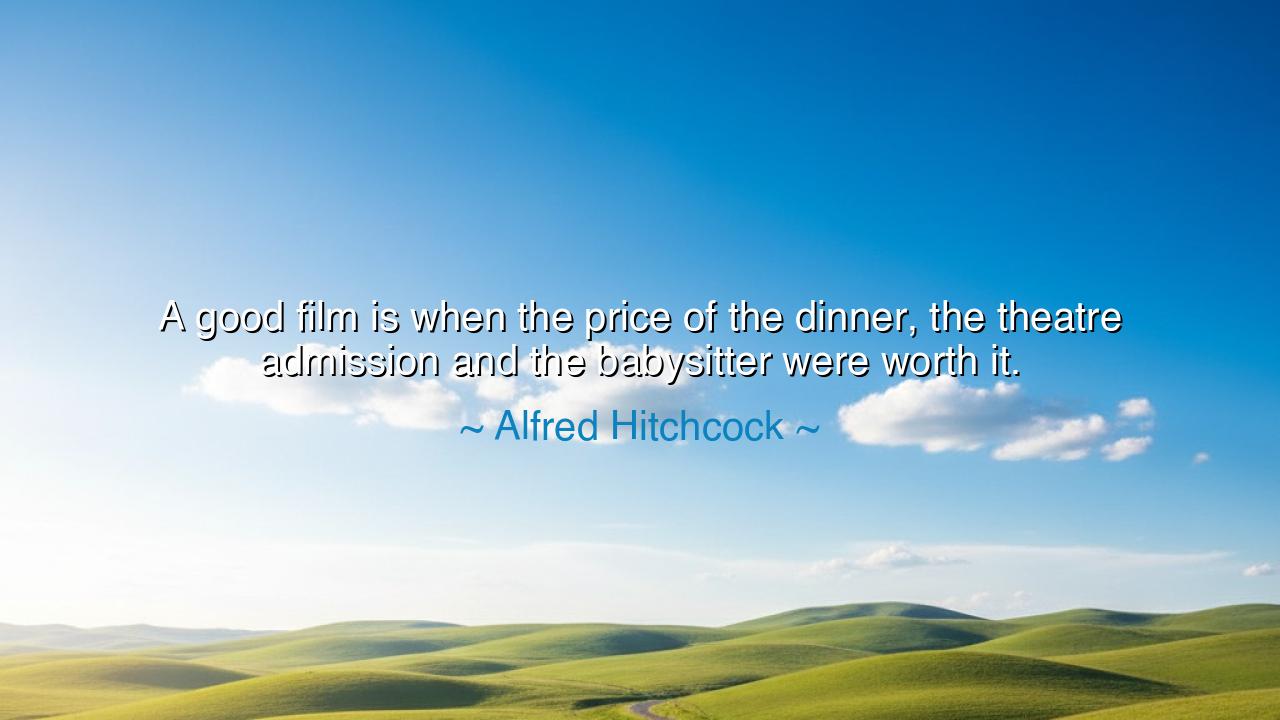
A good film is when the price of the dinner, the theatre
A good film is when the price of the dinner, the theatre admission and the babysitter were worth it.






Hear the wry yet profound words of Alfred Hitchcock, master of suspense and architect of cinema’s darkest delights: “A good film is when the price of the dinner, the theatre admission, and the babysitter were worth it.” Though cloaked in humor, these words reveal a truth as sharp as a blade: that art must not only be clever, nor merely adorned with style, but must move the heart so deeply that the sacrifices made to behold it are repaid a hundredfold. A good film is not measured by critics’ praise alone, nor by awards, but by whether it justifies the time, money, and effort of those who come to witness it.
The meaning of this saying lies in its grounding of art in the everyday struggles of ordinary people. For to see a film is rarely without cost. One leaves the home, sets aside other duties, entrusts the children to another’s care, and pays the coin for admission. Thus, a movie must be more than passable entertainment; it must reward the sacrifice. Hitchcock, a man who understood audiences better than most, reminds us that true cinema must honor its viewers, giving them something unforgettable—thrills, laughter, tears, or wisdom—so that they leave not diminished, but enriched.
History gives us many examples of such reward. Consider the premiere of Gone with the Wind in 1939. Families traveled long distances, spent what little they had, and endured the crush of crowds to behold it. Yet they departed in awe, carrying with them images and words that would echo across generations. The cost of ticket, time, and journey was more than repaid by the grandeur of the story. This is the test Hitchcock sets: does the work give more than it takes? If it does, it is truly a good film.
Hitchcock himself was a master of this bargain. When audiences entered to see Psycho, they paid for their tickets as for any other show. Yet what they received was something shattering: a shock to their expectations, a plunge into dread, a story that redefined horror forever. For the price of an evening, they gained a cultural moment that would haunt cinema for all time. The babysitter and dinner bill became small in comparison to the memory carried for a lifetime.
This wisdom stretches beyond the walls of the theatre. In truth, it applies to every act of creation, every work we offer to others. Whether it is a speech, a book, a song, or even a shared moment of conversation, the question remains: does it give more than it costs? Does it leave those who joined us enriched, inspired, or moved? If so, then it is worthy. If not, it has failed, no matter how polished its form. Hitchcock teaches us that greatness is not in complexity, but in impact.
The lesson for us is thus: respect the time, the labor, the sacrifices of those who come to hear or see what you create. Do not treat your audience lightly. Give them something that justifies their effort, something that lingers beyond the moment. Strive always to deliver truth, beauty, or power in what you offer. For every act of art is a silent covenant: the audience brings their time and their trust, and you must repay them with something that makes it all worthwhile.
So, children of tomorrow, hold these words close: “A good film is when the price of the dinner, the admission, and the babysitter were worth it.” In them lies the essence of responsibility to one’s audience, and the call to give more than you take. Let your works, your actions, your very life itself be worth the cost others pay to share it with you. For in this exchange lies the mark of greatness—not only in cinema, but in all the arts of living.






AAdministratorAdministrator
Welcome, honored guests. Please leave a comment, we will respond soon